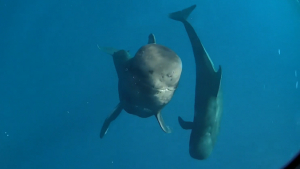
For the first time, scientists have meticulously calculated the “energetic budget” necessary for Hawaiʻi’s short-finned pilot whales to perform their remarkable 800-meter (2,600-feet) dives in search of food. This groundbreaking study, spearheaded by the University of Hawaiʻi at Mānoa’s Hawaiʻi Institute of Marine Biology (HIMB), reveals that an average adult whale must consume 142 squid daily to sustain itself. This requirement scales up to an astounding 416 million squid annually for the entire population of these deep-diving marine mammals.
The findings, published in the Journal of Experimental Biology, establish a critical benchmark for the conservation of these historically understudied creatures. According to William Gough, Marine Mammal Research Program (MMRP) postdoctoral researcher and lead author of the study, “Pilot whales are one of the only oceanic dolphins that regularly dive to extreme depths—up to 1,000 meters—to find prey. This deep-diving, high-risk foraging strategy requires a delicate balance between the energy they spend and the energy they acquire. Our study is the first step in quantifying that balance for this specific population.”
Understanding Energetic Needs for Conservation
Understanding the precise energy requirements of these animals is crucial for developing effective management strategies to mitigate threats and ensure their survival. Lars Bejder, MMRP director and co-author of the study, emphasized, “This detailed scientific data gives Hawaiʻi management agencies a critical tool to monitor how changes in the ocean—from warming waters to ship noise—might push the pilot whales past their survival limit.”
The deep waters surrounding the Hawaiian Islands are home to a genetically distinct population of short-finned pilot whales. These highly social, toothed whales are not migratory; they remain with their tight-knit, multi-generational families in one region for life. The population forages year-round, primarily hunting squid, which is their preferred prey.
Challenges and Adaptations
Deep-diving species like pilot whales are particularly vulnerable to human-induced disturbances, such as ship noise or changes in ocean temperature, which can disrupt their foraging or increase their energetic costs. Gough noted, “If they use more energy than they can find, they face an energy crisis that weakens their health, hurts their ability to fight off disease, and ultimately limits their ability to reproduce and recover the population.”
Despite these vulnerabilities, the Hawaiian pilot whale population benefits from a stable and abundant squid food source, potentially better equipping them to cope with environmental disturbances compared to populations elsewhere. This resilience may be crucial as climate change continues to alter ocean conditions globally.
Innovative Research Methods
The research team employed advanced Customized Animal Tracking Solutions (CATS) tags on eight short-finned pilot whales off the coast of Lānaʻi between 2021 and 2024. These tags recorded movement, depth, and sound, and utilized 2K cameras with LED headlights to observe the whales in their lightless, 800-meter-deep hunting habitat. By combining data from these tags with body measurements from aerial drone footage, the researchers developed a novel method to estimate minute changes in energy usage.
Gough expressed his enthusiasm for the project, stating, “Getting to be on the water and close to these animals is an absolute joy. But the fact that we can see into their world, even at 800 meters and under extreme pressures [80 times that at the surface], and observe them capturing their food in complete darkness, feels unbelievable to me. It’s truly a privilege to document the lives of these elusive, deep-diving whales.”
Looking Forward: Implications for Marine Conservation
The insights gained from this study provide a foundation for future conservation efforts aimed at protecting short-finned pilot whales. As ocean conditions continue to change, understanding the energetic needs and vulnerabilities of these animals will be pivotal in shaping effective management policies.
Moving forward, the research team plans to expand their studies to include other deep-diving cetaceans, aiming to build a comprehensive understanding of the energetic demands of these remarkable ocean dwellers. Such knowledge will be essential in crafting strategies to preserve marine biodiversity in the face of increasing environmental pressures.
As the University of Hawaiʻi continues to lead in marine biology research, the hope is that these findings will not only aid in the conservation of pilot whales but also inspire further studies into the complex lives of deep-sea creatures.







